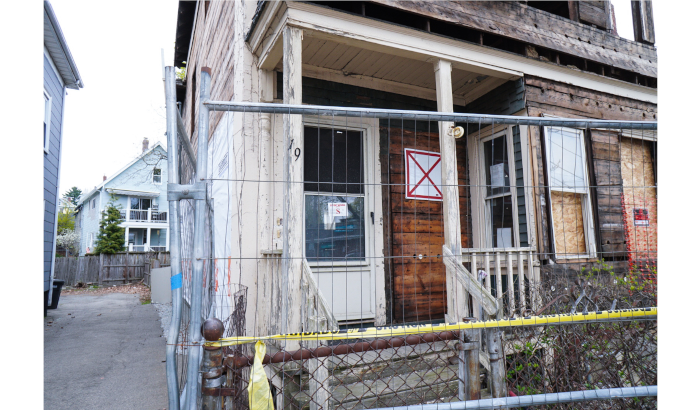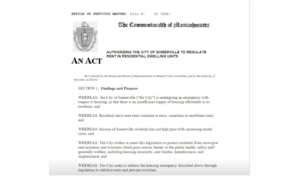Councilors plan to meet with officials from Inspectional Services and the Office of Housing Stability as helpful bill works its way through the state legislature
(Somerville Wire) – With the legislature still deliberating on a key tenant protections bill, the City of Somerville is searching for ways to keep renters in their homes.
“A big problem in Somerville and surrounding communities is the conversion of owner-occupied or locally-owned homes into the speculative market by large corporations who invest and raise rents on the purchased properties,” Sen. Pat Jehlen said.
The senator is sponsoring the Tenant Opportunity to Purchase Act (H.1426/S.890)—a pending bill that guarantees tenants the right of first refusal when their building goes up for sale, and provides them with sufficient notification to act before an eviction occurs.
“TOPA is not going to stop that problem, but it could slow down displacement,” Jehlen continued. Previously, former governor Charlie Baker vetoed the TOPA bill and the legislative session expired soon after, preventing a legislative override.
As the refiled bill makes its way through the tortuous Beacon Hill legislative process, some tenants are only learning about renovations through eviction notices. City officials and lawmakers say improving communications with tenants around redevelopment could be an important incremental step.
“To walk around thinking my entire universe that’s grounded in my housing could go away at any point … I think everything we can do to provide ample and adequate notice to tenants is really helpful. The more notice a tenant can have, the more opportunity they have to act,” Rep. Mike Connolly said.
That’s why Councilor Matt McLaughlin submitted an order on April 13, recently approved in the Housing and Community Development Meeting, which calls for the director of Inspectional Services and the director of the Office of Housing Stability to meet with the Council to discuss how the City might identify new housing construction and renovation that could displace tenants.
“Just this week, I got an update that a building in my neighborhood is having a gut rehab and is evicting all its tenants,” he said during the regular council meeting. In an interview with the Wire, McLaughlin added that he took action after he received a related inquiry from the Community Action Agency of Somerville. CAAS declined to comment as the order has only just been filed.
“Basically, we’re trying to bolster communications with ISD and OHS to improve notifications about things like permits,” McLaughlin concluded.
But there’s concern that once a permit is involved, which is typically the city’s first touch on a project, it could be too late for tenants, Legislative Liaison Hannah Carrillo noted during a Housing and Community Development Meeting on April 19.
“In a perfect world, we could track the sales of homes.” Councilor Jesse Clingan said during the same meeting. “I think a lot of times when a new property has been purchased, people are often at risk because the new owner has plans on what to do with the property.”
The Council expects to get a clearer sense of its data and potential avenues to improve communications at the next housing meeting, McLaughlin said.
Councilor Kristen Strezo has submitted a budget request to hire a data analyst in the Office of Housing Stability. “This is something they could do if this position did exist in that department,” Strezo said, referring to monitoring the housing market and assessing projects that risk displacement.
While it lacks the right data analyst, the City at least has a model for tracking and assessing landlord’s intent to renovate. The Condominium Conversion Ordinance, which protects tenants’ rights during the conversion of a rental property into condominium units, contains nine “factors” that constitute the “intent to convert,” including a landlord preparing a deed, retaining a real estate agent, or visiting the bank to inquire about a refinance. While the ordinance’s purview is restricted to condos, and cannot be expanded to more generic applications without the State’s approval, it provides a model for gauging landlord intent to renovate or construct before a project reaches its permit stage.
“I think that there are very clear actions that property owners can take to signify that they are going to move in a direction of displacement whether it’s in the form of wanting to rehab a building, to turn it into luxury units, changing the use of the property, what have you,” Carrillo said last Wednesday.
But even with better data on housing redevelopment, discussions remain over what constitutes a risk of displacement.
This article is syndicated by the Somerville Wire municipal news service—a project of the IRS 501(c)(3) tax-deductible nonprofit Somerville Media Fund.
All Somerville Wire articles may be republished by community news outlets free of charge with permission and by larger commercial news outlets for a fee. Republication requests and all other inquiries should be directed to somervillewire@somervillemedia.fund.
SUBSCRIBE TO THE SOMERVILLE WIRE EMAIL NEWSLETTER: http://eepurl.com/hX3alr
Check out all our social media here: https://linktr.ee/SomervilleWire.
Ryan DiLello is the staff reporter for the Somerville Wire





